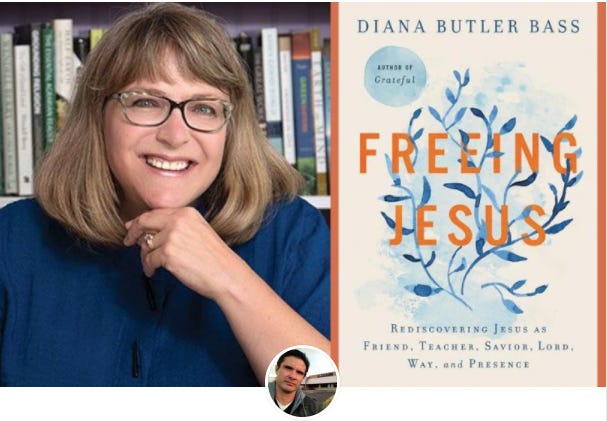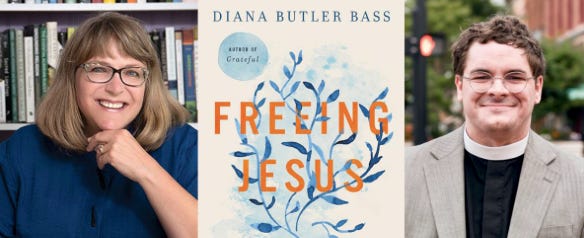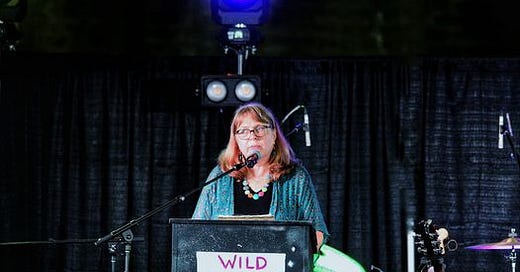

Discover more from The Cottage
Book launches are all-consuming. In the last two weeks, I’ve had innumerable conversations with interviewers, podcast hosts, and book groups. Despite the fact that I feel like my headphones are permanently attached to my ears, it has been rewarding. Tiring, yes. But good.
The best part of any book release is the chance to see my own work differently. For a year or two, no one knows the story except the author. That changes once a book goes into the world and others read the pages that have been so closely held for so long. I love hearing responses from readers. People point out things I didn’t notice, press me to go deeper in subjects I may have skimmed over, and come up with questions I never imagined. The book takes on new life.
One of the biggest surprises is how much people want to talk about the first chapter: Jesus as Friend. For some readers, the warmth and nostalgia of the toddler Sunday school takes them back to their own childhood, and they are glad to be reminded of their own first experiences of Jesus in church basement circles or listening to children’s sermons in the big church.
But the response from another group has startled me.
There’s an entire genre of podcasts hosted by ex-evangelical men in their 30s and 40s. I fondly call them my “theo-bros,” and I am very happy that they have found my work. (And I’ve become personal friends with a number of them.)
On one podcast, an interviewer shared how much he liked the “Friend” chapter, even feeling a bit convicted that he’d sometimes ridiculed calling Jesus “friend” (something I mention in the story). But he went on to say how different my earliest memories of Jesus were from his. He’d grown up in an evangelical church. His first Jesus was a terrifying judge whose bloody death offered an escape from hell. There was no warmth, no childhood embrace. Just the threat of eternal oblivion if he failed to accept Jesus in his heart.
As I listened to him, I felt sad. He envied the lightness of my Methodist Sunday school, saying he never imagined a church where little children might know Jesus as friend.
Sometimes critics attack liberal Protestantism (my tradition, but one that has parallels in social justice Catholicism and other liberal religions as well) as intellectually shallow, without theological heft, and overly sentimental. But writing Freeing Jesus reminded me of the gentle theology that surrounded my childhood — and how those earliest lessons were so important for later faith. To grow up in a liberal Protestant church was not about growing up in theological irrelevance. It was to grow up in a universe glowing with wonder, a kind place where childhood was cherished as spiritual wisdom.
When I wrote Freeing Jesus, I learned that the lessons of my Sunday school circle never really go away. Instead, through my journey, the circle widens, widens, and widens again until I’m sitting in a circle on stage with twenty women — all of different faiths — at the World’s Parliament of Religions in 2015. From Jesus as my friend to the joy of befriending all has been a remarkable journey.
The scary Jesus, however, of my podcast host’s memory is a different matter. Many of who grew up with this vision struggle, needing to deconstruct the childhood faith in order to find another way. While I have certainly struggled (and write about those struggles in Freeing Jesus), no one ever had to convince me about God’s friendship toward the world or that Jesus loves everyone.
But, as has come up in a recent conversations, the scary Jesus does not naturally arc toward love. That Jesus wends toward violence, the sort of we saw on display at the Capitol insurrection on January 6, when a man holding a “Jesus Saves” sign stood next to a gallows with a noose.
Unless something disrupts the narrative, a childhood warrior Jesus easily becomes an adulthood warrior Jesus.
To tell one’s life-story with Jesus isn’t only an exercise in personal memoir. Memoir is a glimpse into theology and culture, how our beliefs and struggles are a microcosm of our larger political and social conflicts. Indeed, memoir reminds us that often our personal struggles have larger ramifications.
Sadly, in the larger story of American religion in recent decades, Jesus-as-friend has receded from cultural memory, replaced by a far more dangerous (and unbiblical) vision of a vengeful Christ.
My main takeaway of these first days of the book tour? We need a better Jesus. A friendlier one. The Jesus who said to his disciples, “I do not call you servants any longer, because the servant does not know what the master is doing; but I have called you friends” (John 15:15).
Maybe in befriending Jesus, we could be friends with one another.
INSPIRATION
Some friends play at friendship but a true friend sticks closer than one’s nearest kin.
— Proverbs 18:24
One who forgives an affront fosters friendship, but one who dwells on disputes will alienate a friend.
— Proverbs 17:9
When I say it's you I like, I'm talking about that part of you that knows that life is far more than anything you can ever see or hear or touch. That deep part of you that allows you to stand for those things without which humankind cannot survive. Love that conquers hate, peace that rises triumphant over war, and justice that proves more powerful than greed.
― Fred Rogers
The typical expression of opening Friendship would be something like, “What? You too? I thought I was the only one.”
— C.S. Lewis
Love is like the wild rose-briar,
Friendship like the holly-tree—
The holly is dark when the rose-briar blooms
But which will bloom most constantly?
— Emily Brontë
We were the kind of friends, instead, who understood that we were forever on the same side: the side of the poor, the economically, spiritually and politically oppressed, “the wretched of the earth.”
― Alice Walker
BOOK LAUNCH CORNER
Two podcasts and a bookstore event — please listen in, join in, share with your friends, and invite others to the conversation about Freeing Jesus.
PULPIT FICTION
Robb and Eric are two mainline pastors who love to talk about the Bible, theology, and good books. I’ve been on their show three times — and really respect and like them!
From the show notes: “We had an wonderful conversation with Diana Butler Bass about her great book: Freeing Jesus. In this, our third conversation, at least two of us were moved to tears as we shared about Jesus, preaching from pickup trucks, grief, and much more.”
To listen, CLICK HERE.
THE BOB CESCA SHOW
This is an enormously fun and funny interview with Bob Cesca, a Sirius XM regular and part of the Sexy Liberal Podcast network. As it turns out, he's also an ex-Catholic who still cares about Jesus. Not your regular church fare -- which makes it perfect for all your post-Christian, religiously unaffiliated friends and those who are just holding on to church by the fingernails!
From the show notes: “FREEING JESUS (is) a bold exploration beyond the narrow confines surrounding the image of Jesus. Ultimately, it's an invitation to leave the Jesus wars behind and rediscover him in entirely new ways, as a teacher rather than a wrathful savior.”
To listen, CLICK HERE.
BARBARA’S BOOKSTORE
April 20 at 8:00 pm - 9:00 pm (Central)
Upcoming live event! Barbara’s Bookstore in Chicago is hosting a conversation about Freeing Jesus with me and Rev. Rob Lee, IV. You can bet that this one will wind up talking about Jesus and justice — and why our stories matter in dealing with politics and challenging social issues. Barbara’s offers a book discount to attendees.
NOTE: This event is Central Time.
For information and to register, CLICK HERE.
Subscribe to The Cottage
Part retreat, part think tank. A place for inspiration and ideas about culture, faith, and spirit.














Diana, you write so authentically about freeing Jesus from where he is found in some churches. I believe there is also a need to free Jesus from the Bible. When I say to some of my "religious friends" that Jesus is more important than the Bible, they just shake their heads and say "That's the dumbest thing I ever heard. Jesus is IN the bible." And I hear Jesus, as you did, "Get me out of here." - Doug Carpenter
So nicely put. Thank you, Diana, for helping us all on this journey.